General
Prof. Edward Bbaale Delivers Professorial Inaugural Lecture
Published
4 years agoon
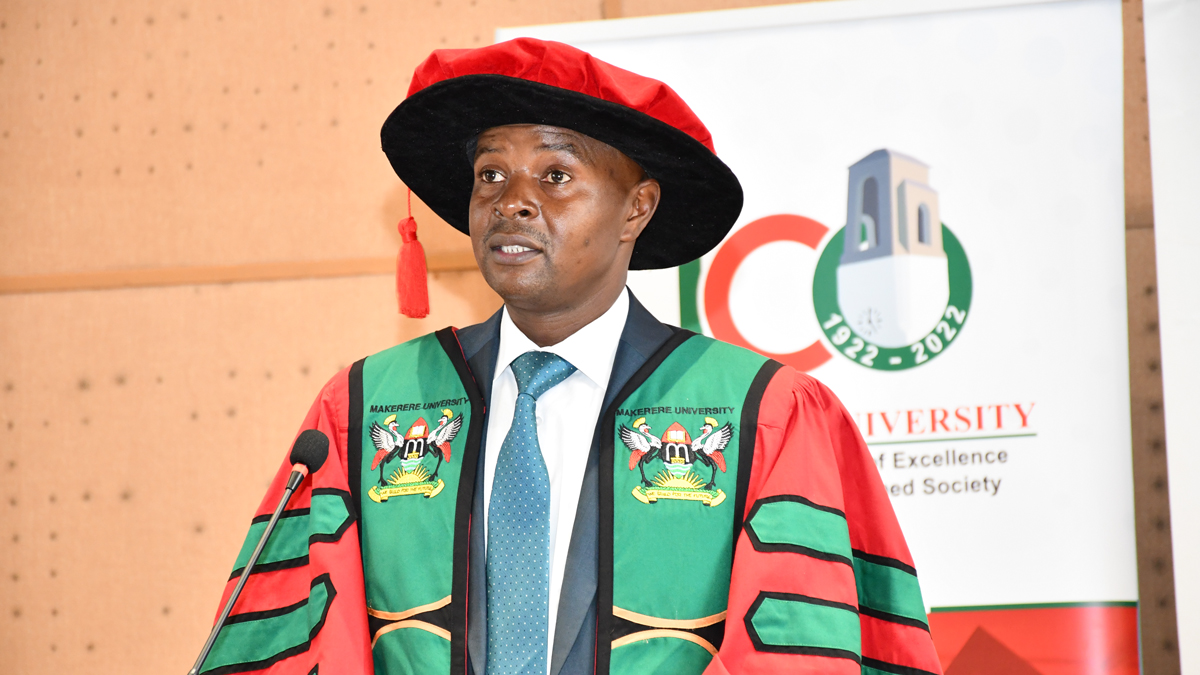
Makerere University on Friday 17th December 2021 held a prestigious event at which Professor Edward Bbaale delivered his Professorial Inaugural Lecture under the theme Rethinking Growth in Africa, Firms and the Business Environment Quality.
The Lecture held during the year-long celebrations to mark 100 Years of Makerere University‘s existence came five months after Prof. Bbaale’s promotion from the rank of Associate to full Professorship.
Professor Edward Bbaale has for the last decade centered his research on firms and African economies, with one part of it looking at the dynamics and economic roles of firms in bridging productivity, export and employment gaps in Africa. His other research puts into perspective the quality of business environment necessary for firms in Africa to flourish.
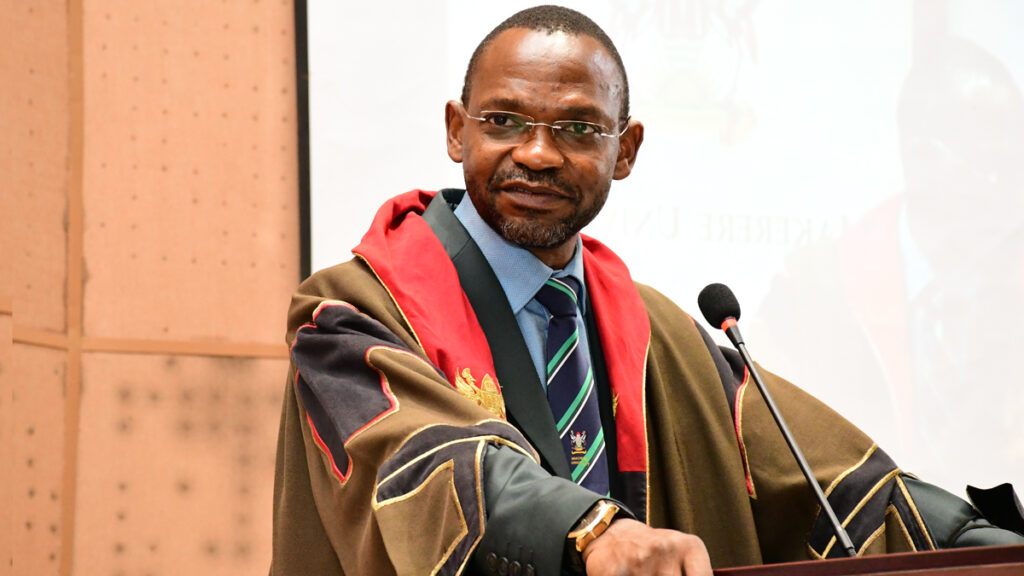
Prof. Bbaale said the country has great potential of technological change, innovation, employment and skilling which can only be attained when the industrial sector is prioritized.
“The contribution of industrialization to GDP was rather higher in the 60s. Due to the volatile economic environment and following what happened in the 1980s and 1990s, we have had a decline in industrialization.
Uganda in the 1990s privatized most of the public enterprises at the urging of the World Bank and the International Monetary Fund. Giving away control of key government parastatals to private individuals during the early days after Uganda had emerged from decades of political turmoil was a mistake, experts have said.
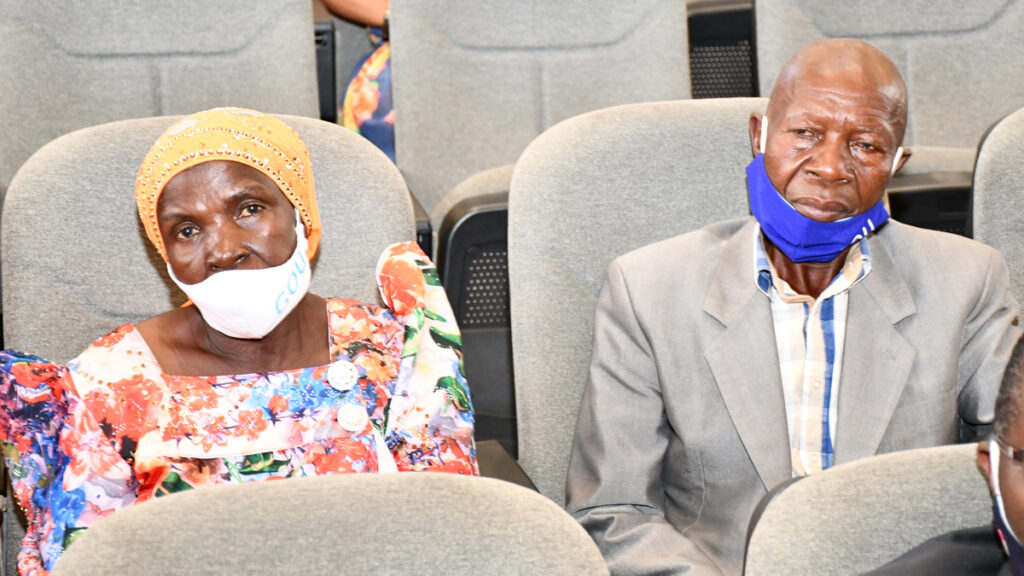
“We have seen a situation which I risk to call de-industrialization where the service sector has taken over industrial and agricultural sectors,” Prof. Bbaale said. “Despite this, majority of our population is employed in the agricultural sector yet it contributes the least. This means poverty can not be escaped unless something is done about agriculture because that is where most of our people are.”
Overall, industrial sector growth in Africa continues to lag behind GDP growth from approximately 17% in 1981 to 12% in 2020. In Uganda for example, the share of the manufacturing sector to GDP continuously experienced weaker growth with a marginal contribution of 4% in 1980 increasing to only 5% in 1990, and to 16% in 2020. This figure is still far below the 20% target specified in NDP III, Prof. Bbaale said.
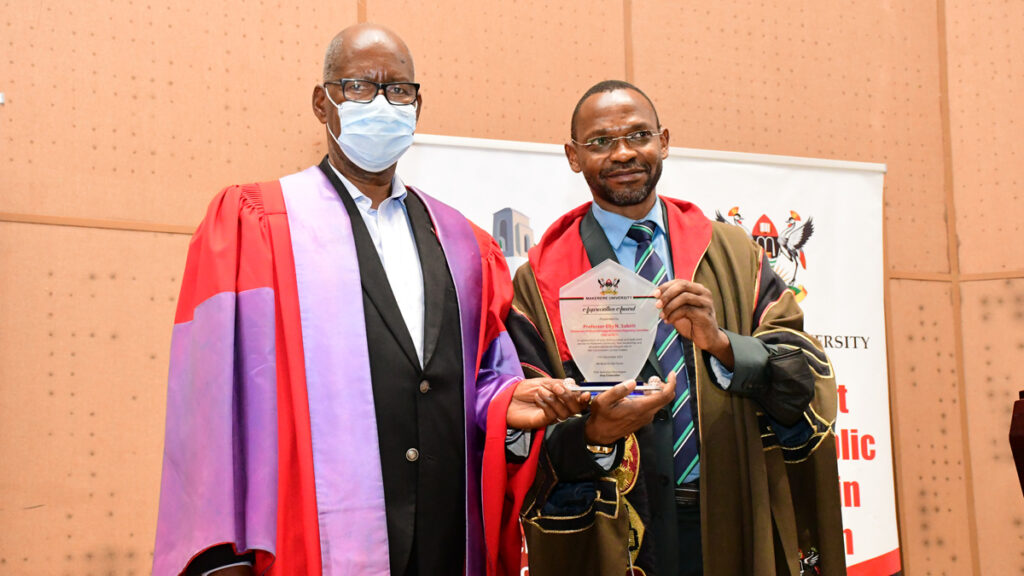
“The implication of this is that although the prudent macroeconomic policies managed to increase GDP growth in Africa, they have not been sufficient enough to spur growth in the industrial sector, which affects its potential for job creation,” Prof. Bbaale added.
“What is required of African economies to revive and sustain their growth, particularly in the industry sector is to refocus on the micro-economic policy environment where business firms operate.”
Prof. Bbaale added that firms in Africa are predominantly small (close to 58%) with few medium and large firms and only 23% of the firms engage in exporting.
In Africa, Firm-level Gross Job Creation Rate (GJCR) stands at 13% while Gross Job Destruction Rate (GJDR) stands at 6%.
Small firms have a low chance of surviving and growing into large scale firms that are more productive. Therefore; low aggregate industrial productivity in Africa is to a greater extent attributed to a large fraction of small firms. Even with more domestic firms, domestic capital accumulation remains too low to boost adequate growth, he said.
Prof. Bbaale, pointed out some of the constraints to the potential of firms to achieve fast growth as the unreliable power supply, huge transportation costs, corruption, poor tax structures and weak laws among others.
One of longest serving professors of Makerere University Prof. Elly Sabiiti commended the great work done by Prof. Edward Bbaale and attributed this kind of achievement to formation of the Professorial Inaugural Lecture Committee in 2007. The Committee was established to guide newly-promoted professors on how disseminate the knowledge accumulated over the duration of their academic journeys for the benefit of the society.
He added that the theme of the Professorial Inaugural Lecture was relevant especially since it comes a at a time when Makerere is celebrating 100 years of excellent service with a milestone of over 90 professors.
Prof. Barnabas Nawangwe, the Makerere Vice Chancellor noted that the University contributes 70% of the research output in Uganda and 3% to the continent. He added that professors like Bbaale are expected to take the lead in the economic development of the country through their comprehensive research.
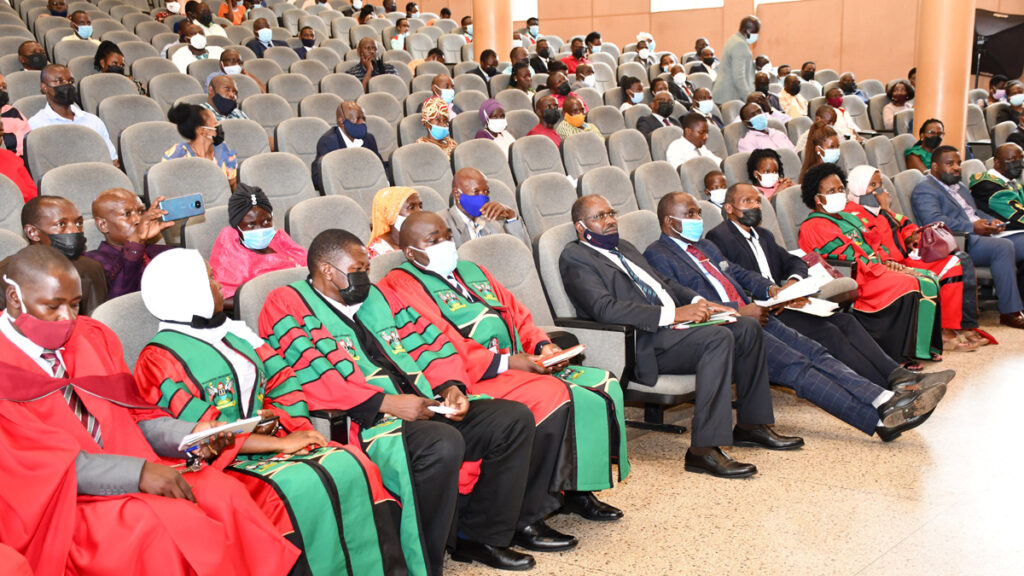
“I am glad to note that the inaugural lecture topic on “Rethinking Growth in Africa: Firms and the Business Environment Quality” is in line with the current global economic challenges arising due to the Covid-19 pandemic. Several business firms both local and international went into unprecedented decline. In Uganda, the informal sector has been greatly affected and livelihoods compromised,” the Vice Chancellor said.
The Deputy Vice Chancellor in charge of Academic Affairs, Assoc. Prof. Umar Kakumba, congratulated Prof. Bbaale upon delivering his Professorial Inaugural Lecture, saying it is a prestigious and highly regarded public talk by an appointed Professor in an academic institution.
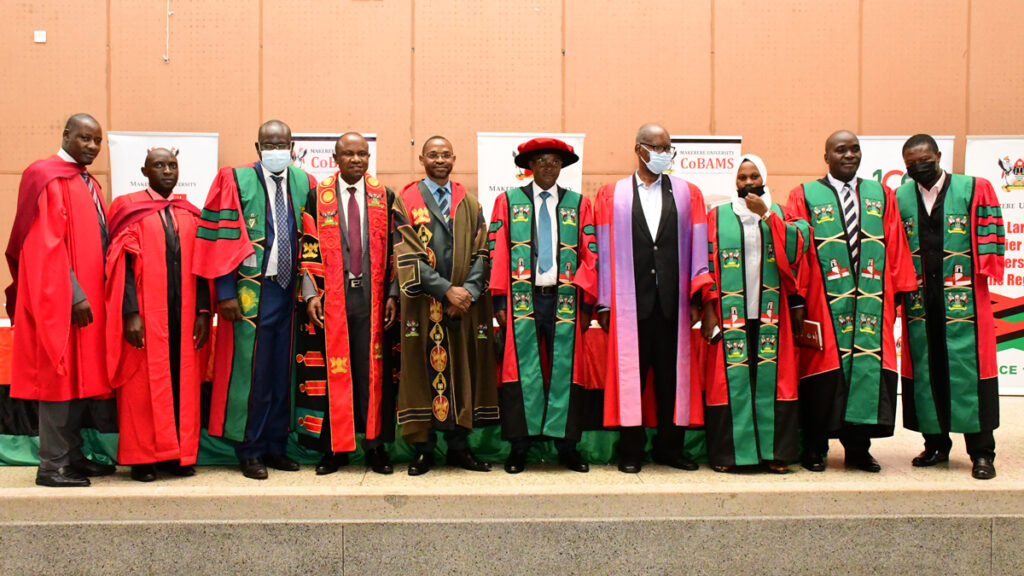
Assoc. Prof. Kakumba said Professor Bbaale’s inaugural lecture theme was very relevant in today’s setting and has provided very important knowledge.
“Professor Bbaale has ably demonstrated the contribution of his academic exploits in economic development. Notably, his lecture is in line with the theme of the Third National Development Plan (NDP III), on “sustainable industrialisation for inclusive growth, employment and sustainable wealth creation”.”
Prof. Bbaale highlighted that overall industrial sector growth in Africa continues to fall behind GDP growth and that the manufacturing sector in Uganda has a marginal contribution to GDP at 16% as of 2020.
“He has argued for more focus on the microeconomic policy environment where business firms operate. This is expected to improve the success of the NDP III,” Assoc. Prof. Kakumba said.
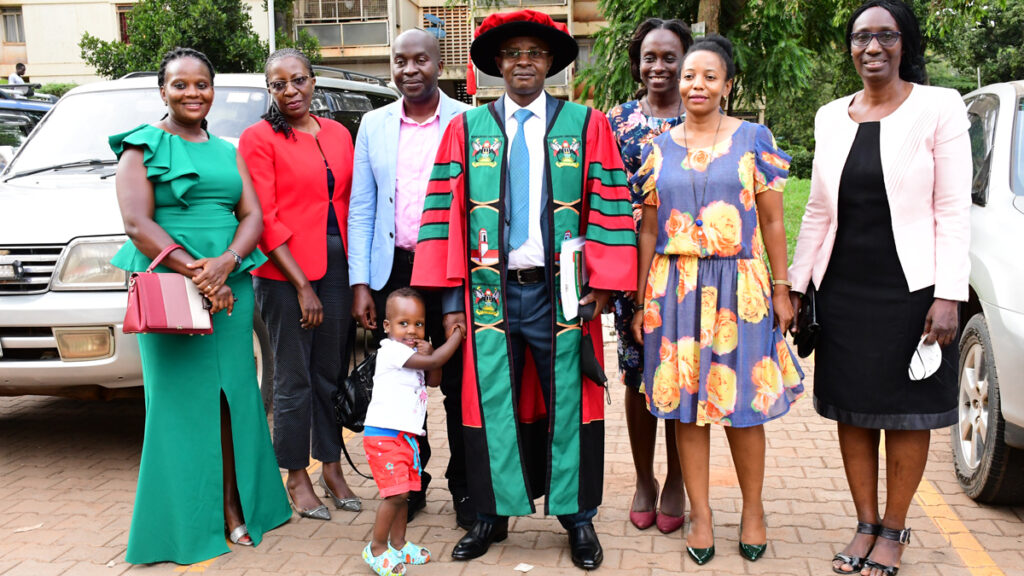
…………………………..
ABOUT PROF. BBAALE
Edward Bbaale is a Professor of Economics and holds a PhD in Economics, M.A. Economic Policy and Planning and B.A. Economics among other qualifications. He is currently the Dean of the School of Economics at Makerere University and the Director of EfD-Mak Centre which is part of the Global Network of Environmental Economics Research Centres supported by Sida. With support from Sida, Edward is the Lead Person at Makerere University for the Inclusive Green Economy (IGE) Capacity Development Program for Senior Civil Servants and Policy Makers. With support from the World Bank, Edward is the Principal Investigator of a Project intended to establish a Public Investment Management Centre of Excellence (PIM CoE) at Makerere University. Prior to that, Edward served as a Graduate Programmes Coordinator for the School of Economics from 2012 to 2013. He has very rich hands-on experience in economics research with a bias towards development microeconomics for enterprises and households. He was in 2017 awarded a post-doc scholarship by the Austrian Agency for International Cooperation in Education & Research (OeAD-GmbH) to undertake research at the Vienna Institute of International Economic Studies (wiiw) in Vienna-Austria. He was in 2013 nominated as a Visiting Fellow for the Journal of African Economies, Department of Economics, University of Oxford, UK. He was in 2010 nominated for the Visiting Research Fellow Position at the Centre for Global Development in Washington D.C. USA. He was in 2019 appointed a Chairperson of the Governing Council of Kampala Polytechnic-Mengo. He was in 2021 appointed a Member of the University Council at Muteesa I Royal University. He was in 2021 appointed Member of the National Task Force on the Enhancement of Labour Productivity. He is an External Examiner at Kyambogo University, University of Malawi, University of Zambia, University of Namibia, National University of Lesotho, and University of the Witwatersrand, South Africa. He was an External Examiner at the University of Zimbabwe 2015/16-2019/2020. He is a Member of the Expanded Board of the Uganda’s National Planning Authority since 2015. He is a member of Senate of Makerere University and sits on the Admissions and Mature Age and Pre-entry Committees of Senate. He was a Chairperson of a Special Task Force that developed the Student Work and Employment Scheme Policy at Makerere University. He is a member of the African Economic Research Consortium Academic Advisory Board in Nairobi, Kenya. He is the Vice Chairperson of Makerere University Deans’ Forum (MUDF). He is a member of the Scientific Committee of the United Nations Economic Commission for Africa Young Economists Network (ECA-YEN).
Edward has authored over 40 papers and, published in peer reviewed journals. Two of his papers were voted as Highly Commended Award Winners at Literati Network Awards for Excellence 2012 and 2019 (<http://www.emeraldinsight.com/literati>). At national level, he has implemented a number of policy-relevant research projects with key Government Ministries and Agencies as well as the private sector.
You may like
General
Simplicity, Service & Scholarship: Hallmarks of Professor Livingstone Luboobi’s Legacy
Published
9 hours agoon
July 18, 2025By
Eve Nakyanzi
On Wednesday 16th July 2025, Makerere University lost one of its most cherished sons, Professor Livingstone Sserwadda Luboobi. Described as a mathematician, academic leader, and humble servant, Professor Luboobi devoted more than five decades to the university, rising through the ranks to become Vice Chancellor, and leaving a legacy defined by simplicity, service, and scholarship.
Born to Lameka Serwadda and Sanyu Serwadda on 25th December 1944 in Mitondo, Kalisizo, Kyotera District, Professor Luboobi’s academic career begun as a third-year student at Makerere and continued with unwavering loyalty until his passing. His life’s work reflected not only a commitment to mathematics but also nurturing generations of scholars and leaders across Uganda and beyond.
A funeral service was held in his honour at St. Francis Chapel, Makerere University on 18th July 2025. It was a moment of solemn remembrance and heartfelt tribute. Rev. Canon Dr. John Senyonyi delivered the sermon titled “Only God Knows,” reminding mourners of the mystery and grace of life’s journey. Rev. Canon Geoffrey Byarugaba represented the Kampala Diocese at the service, while former St. Francis Chaplain, Rev. Dr. Canon Johnson Ebong thanked Professor Luboobi for spearheading the Chapel’s expansion. Friends, colleagues, and family members filled the chapel, joined in mourning but also in gratitude for a life that had deeply touched theirs.

Mrs. Lorna Magara, Chairperson of the University Council, spoke movingly about Professor Luboobi’s faithfulness, likening his life to the biblical call in Mark 10:43, “Whoever wants to become great among you must be your servant.”
In his condolence message, the Vice Chancellor, Professor Barnabas Nawangwe, hailed Professor Luboobi as a visionary leader whose legacy is deeply woven into Makerere’s identity as a research-led institution. He credited Professor Luboobi with laying the groundwork for a culture of inquiry—championing graduate programmes, encouraging doctoral training, and fostering international collaborations that strengthened the university’s research profile. “He believed in building systems, not just structures,” noting that many of Makerere’s current research policies stem from his leadership. Even in retirement, Professor Luboobi remained a source of wisdom and guidance, quietly shaping the future of the university he so deeply loved.
Speaker after speaker painted a portrait of a man who led not by pomp, but by quiet strength and deep conviction. The Principal, Professor Winston Tumps Ireeta, speaking on behalf of the College of Natural Sciences (CoNAS), described Professor Luboobi as a foundational figure whose influence is deeply etched in the structures and spirit of the college. He spoke with emotion about Luboobi’s unwavering commitment to academic integrity and his belief in the power of mentorship.

“He was not just a mathematician,” Professor Ireeta said, “he was a visionary who understood the soul of the university. Even in retirement, he remained an advisor, a guide, and a quiet force of wisdom.” He concluded by saying that the college would continue to draw from his example as it navigates the future of science and innovation in Uganda.
Professor Luboobi’s illustrious career at Makerere University included serving as Head, Department of Mathematics from 1990 to 1991. The current Head of Department, Dr. Ismail Mirumbe remembered him as a pillar in the teaching and development of mathematics in Uganda
Professor John Mango, who served as Head, Department of Mathematics during Professor Luboobi’s term as Vice Chancellor from 2004 to 2009 described him as a towering figure of integrity and principle, someone who not only upheld the highest standards of academic conduct but insisted that others around him do the same. “He was a pillar in the department,” Prof. Mango remarked, “and his moral compass was unwavering.”

He recalled instances where Professor Luboobi made firm decisions, including terminating contracts when integrity was compromised, setting a tone that shaped the department’s reputation for honesty and excellence. Even as Vice Chancellor, he remained deeply involved in the department’s affairs, teaching, supervising students, all the while handling top administrative duties punctually. Prof. Mango spoke with great admiration of a man who led by example, mentored many, and whose contributions to mathematics education, research, and policy-making continue to shape the future of the discipline in Uganda and beyond.
According to an article from 1990 written by Dr. Vincent Ssembatya and Andrew Vince at the University of Florida, the Uganda Mathematical Society (UMS), which was formally established on 25th November, 1972 has since inception enjoyed major support from Makerere University and Kyambogo University in terms of infrastructure and leadership. Professor Paul Mugambi, who was also present at Professor Luboobi’s funeral service was elected first president of the UMS. Dr. Saul Nsubuga from the Department of Mathematics represented UMS at the service, honouring Professor Luboobi’s pioneering role in the discipline.
The service also featured tributes from close friends and family. Loved ones shared stories of a man who remained grounded no matter how high he rose, a man who valued relationships and walked closely with his faith. His children and grandchildren remembered him as a father who was ever-present, a listener, and a source of steady guidance.

Professor Daniel Kibuule, son of the late Professor Luboobi and Dean, Faculty of Health Sciences at Busitema University, delivered a deeply personal tribute that painted a full portrait of his father’s life, values, and final days. He expressed gratitude to the University leadership, family, friends, and medical professionals who stood with them during a challenging period. He particularly thanked his siblings, Dr. David Kimera and Dr. Irene Nakiyimba for their unwavering role in caring for Professor Luboobi through illness.
He spoke of a man who, despite great academic accolades, remained deeply humble and committed to discipline, simplicity, and faith. From instilling punctuality and responsibility to ensuring his children charted their own paths, none bearing his surname “Luboobi”, Prof. Luboobi was intentional in every lesson he passed on. Kibuule recalled his father’s insistence on being at home even in his final moments, his strong connection to Christ, and his quiet strength despite his failing health.
Former students and mentees echoed the same sentiments, of a teacher who was generous with his time and invested deeply in others’ growth. The community that gathered was not only there to grieve but to celebrate the quiet legacy of a man whose example continues to live on.
Among the mourners were public figures and leaders, including Hon. Abed Bwanika, Member of Parliament for Kimanya-Kabonera, Hon. Nyombi Thembo, the Executive Director Uganda Communications Commission, and Hon. Dr. Ham-Mukasa Mulira, former Minister of ICT, among others.
In his passing, Makerere University has lost a pillar, but his life reminds us that greatness lies in consistency, in humility, and in service to others. Professor Luboobi’s memory will continue to live on in the minds he shaped, the systems he built, and the values he embodied. He ran his race with grace.
The Writer is a Volunteer in the Public Relations Office, Makerere University
Please click the embedded video below to view the service livestream
General
Public University Legal and Accounting Officers Trained on Governance and Compliance
Published
2 days agoon
July 17, 2025By
Eve Nakyanzi
Legal and accounting officers from public universities across Uganda have convened, for a high-level training workshop organized by Makerere University. The three-day training, taking place from July 16th to 18th, 2025, is aimed at strengthening legal frameworks, improving institutional governance, and ensuring compliance with public finance and procurement laws within higher education institutions.
Ms. Lorna Magara, Chairperson of the Makerere University Council and Guest of Honour at the opening session, commended the initiative as timely and necessary. She addressed the growing backlog of court cases affecting Makerere and other public universities and outlined measures already taken to mitigate legal risks. These include the establishment of a Legal Rules and Privileges Committee and the Directorate of Legal Affairs, part of a broader strategy to improve legal compliance and foster good governance.
Representing the Vice Chancellor, Prof. Winston Tumps – Ag. Deputy Vice Chancellor (Finance and Administration), described the training as both strategic and practical. “It is imperative that we learn from each other, especially in how we handle employee litigation and institutional legal risks,” he remarked. He added that the program is designed to promote experience-sharing across universities and enhance collective institutional growth.

In his address, Mr. Yusuf Kiranda, University Secretary at Makerere University, emphasized the urgent need for robust legal oversight and more effective case management mechanisms within public universities.
The training featured a keynote address by the Attorney General of Uganda, Hon. Kiryowa Kiwanuka, who provided critical insights into legal expectations for public institutions. He warned that failure to heed legal advice could result in personal liability for accounting officers, citing a precedent involving the Uganda Cancer Institute. “Universities must consult the Attorney General’s chambers before entering into major contractual obligations,” he advised, urging legal officers to document decisions meticulously as proper record-keeping forms the first line of defense in legal disputes.

Hon. Kiwanuka further discussed the government’s ongoing efforts to recentralize legal services to ensure alignment with the Attorney General’s office. He cautioned in-house counsel against becoming overly entangled in decision-making processes, stressing the need for objectivity. Other key issues he addressed included contract approvals, misuse of Memoranda of Understanding (MoUs), and lapses in procurement processes, particularly at the close of financial years.
Participants also benefited from insights by Hon. Justice Musa Ssekaana of the Court of Appeal, who offered an in-depth analysis of judicial review and its significance in promoting lawful, transparent university governance. He called on university legal officers to act with clarity, timeliness, and accountability.
Lady Justice Joyce Kavuma, Judge of the High Court, delivered a comprehensive presentation on dispute and claim management involving public universities. She addressed emerging trends in civil litigation, emphasizing the importance of due process, transparency, and clear communication in resolving employment, student, and contractual disputes. Drawing on real case examples, she urged institutions to strengthen internal systems, embrace participatory governance, and adopt regional best practices to minimize litigation and protect institutional reputation.

The training reflects a shared commitment among public universities to build a more accountable, legally sound, and strategically aligned higher education system in Uganda. Through peer learning and collaboration, participating institutions aim to reduce litigation, enhance institutional autonomy, and uphold the rule of law.
Participating universities include Makerere University, Kyambogo University, Mbarara University of Science and Technology, Busitema University, Mountains of the Moon University, and Lira University.
The training concludes on July 18th 2025, with sessions focusing on employment dispute management in public universities and the implications of recent PPDA Appeals Tribunal decisions on procurement and disposal practices within public entities.
General
Celebrating the Life of Prof. Livingstone Sserwadda Luboobi
Published
2 days agoon
July 17, 2025By
Mak Editor
A Visionary Leader, Seasoned Mathematician, & Humble Academician
It is with profound love and respect that we celebrate the life of Prof. Livingstone Sserwadda Luboobi, a distinguished scholar, transformative leader, and beloved Vice Chancellor Emeritus of Makerere University. His legacy is woven in the fabric of African higher education, marked by intellectual brilliance, unwavering commitment to academic excellence, and a life of selfless service.
A Life of Purpose and Vision
Prof. Luboobi was more than a mathematician. He was a visionary, whose work transcended equations and research papers. Serving as Vice Chancellor from 2004 to 2009, he led Makerere University through a critical period of growth and transformation. Under his guidance, the university expanded its reach, strengthened its academic rigor, and embraced innovation and reform. His calm demeanour and principled decision-making earned the admiration of students, faculty, and peers alike.
Prof. Luboobi was deeply committed to nurturing talent and fostering intellectual curiosity, leaving an indelible mark on the institution’s culture and future direction.
Beyond Uganda, Prof. Luboobi’s influence resonated across the global academic community. He was a passionate advocate for the transformative power of science and education, often speaking at international forums and collaborating on research that bridged continents and disciplines. His work helped elevate the profile of African scholarship on the world stage.
His legacy endures not only in the impressive body of work he left behind but also in the countless lives he touched – students, educators, and leaders who continue to draw inspiration from him.
Academic and Leadership Journey at Makerere University
An illustrious alumnus of Makerere University, Prof. Luboobi graduated with First Class Honours in Mathematics, laying the foundation for an extraordinary academic journey. He pursued further studies at the University of Toronto (MSc in Operations Research, 1971-72) and the University of Adelaide (PhD in Biomathematics, 1978–80). His scholarly journey spanned prestigious institutions worldwide, including UCLA, the University of Bergen, and the University of Dar es Salaam, establishing him as a scholar of global repute and a proud ambassador of African intellectualism.
Prof. Luboobi’s service to Makerere begun in 1970 as a Special Assistant-remarkably, while still an undergraduate, rising through the ranks to full Professor in 1997. He served as Head of Department, Dean of the Faculty of Science (1994–2001), and later became the university’s first elected Vice Chancellor. His tenure brought new energy to institutional leadership, characterized by transparency, inclusivity, strategic direction and accountability.
Strategic Reforms and Institutional Impact
A true architect of transformation, Prof. Luboobi chaired the development of Makerere’s first locally-conceived Strategic Plan (1990–91). He was instrumental in securing a UGX30 billion grant from NORAD in 1999, which revitalized key academic areas such as computing, gender studies, and food science. He co-founded the Makerere University Private Sector Forum, bridging the gap between academia and industry, and strengthening alumni engagement and resource mobilization.
Pioneering Biomathematics and Mentorship
As one of Africa’s pioneering biomathematicians, Prof. Luboobi introduced mathematical modeling to tackle real-world problems in epidemiology, ecology, and operations research. His scholarly contributions – over 150 publications – reflect the depth and breadth of his research. Yet, perhaps his most lasting impact lies in mentorship: he supervised more than 35 PhD and over 50 MSc students, including Makerere’s first female PhD graduate in Mathematics, nurturing a generation of scholars and leaders.
Prof. Luboobi’s Contribution to the Internationalization of Makerere University
Prof. Luboobi played a pivotal role in advancing the international profile of Makerere University. Demonstrating remarkable personal commitment, he utilized his own resources to support the establishment of the University’s International Office. This strategic initiative laid the foundation for a more structured and effective engagement with global academic institutions, development partners, and international students. As a result, Makerere University significantly enhanced its global footprint, forming numerous international collaborations and attracting increased academic and research opportunities from abroad.
In addition to his contributions to internationalization, Prof. Luboobi was also instrumental in revitalizing the University’s Public Relations Unit. Under his guidance, the unit adopted more proactive and professional communication strategies, which greatly improved the institution’s public image. This, in turn, fostered greater public trust and strengthened the university’s reputation both locally and internationally. His visionary leadership in these areas has had a lasting impact, positioning Makerere University as a leading institution in East Africa and beyond.
Global Recognition and Enduring Legacy
Prof. Luboobi’s contributions earned him widespread recognition. In 2008, the University of Bergen awarded him an Honorary Doctorate for his role in internationalizing academia. Makerere University honoured him with a Lifetime Achievement Award in 2013, and the Government of Uganda conferred upon him a National Gold Medal for his unwavering service to education and national development.
Even after retirement, Prof. Luboobi remained an active contributor to academic life-lecturing, supervising, and advising the university.
A Lasting Light in African Academia
Prof. Livingstone Sserwadda Luboobi’s life was a model of scholarship anchored in service, leadership tempered with humility, and an unshakable belief in the power of education. He leaves behind a vibrant academic legacy and a trail of inspired minds. His contributions will continue to shape Makerere University, Uganda, and the global academic community for generations to come.
We extend our heartfelt condolences to his family, colleagues, and the entire Makerere University community during this difficult time.
May his soul rest in eternal peace.
Trending
-

 General2 weeks ago
General2 weeks agoRe-advert: Admission to Undergraduate Programmes 2025/2026
-

 General1 week ago
General1 week agoRe-Advert for Applications for Diploma and Certificate Training
-

 General5 days ago
General5 days agoMakerere University Fees Waiver for 40 First Year Female Students 2025/2026
-

 General2 weeks ago
General2 weeks agoPress Statement on Ranking
-

 Health1 week ago
Health1 week agoCall for Applications: Responsible Conduct of Research (RCR) Training Course
